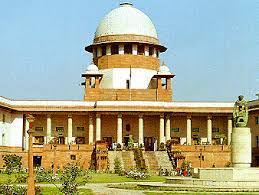The first respondent, an electricity transmission company called Ratnagiri Gas And Power Private Limited [“RGPPL”/first respondent.], filed a petition under Section 79 of the Electricity Act, 2003 against the appellant, Maharashtra State Electricity Distribution Co. Ltd. [“MSEDCL”/appellant.], seeking the resolution of issues arising out of the nonavailability of domestic gas; beneficiaries’ reservations to allow the first respondent to enter into contracts for alternate fuel, the revision of the Normative Annual Plant Availability Factor [“NAPAF”.] and directions to the beneficiaries to pay fixed charges due to the first respondent. (Para 2)
CERC, by its order dated 30 July 2013 held the appellant liable to pay fixed charges to the first respondent. CERC’s decision was upheld by APTEL by the impugned order. (Para 3)
The first respondent filed an execution petition before APTEL seeking the payment of Rs 5287.76 crores together with an amount of Rs 1826 crores in accordance with the APTEL order dated 22 May 2013. Notice was issued on the execution petition by an order dated 25 November 2022. (Para 4)
In this letter, the first respondent stated that due to the shortfall in the supply of domestic gas, the first respondent was unable to achieve the target availability stipulated in the tariff order. According to the first respondent, this, in turn, was impacting their ability to make full fixed cost recovery and hampering the viability of the project. The appellant was requested to schedule its energy requirements accordingly based on capacity declarations made by the first respondent. (Para 8)
The appellant refused to schedule power at the rates stipulated in the above letter. The appellant stated that in accordance with Clause 5.9 of the PPA, the first respondent failed to obtain the appellant’s approval before entering into the GSA/GTA with GAIL. As such, the declaration of capacity on RLNG was stated to be unilateral and arbitrary and in violation of the terms of Clause 5.9 of the PPA which mandated prior approval from the appellant. Therefore, the appellant stated, that it stood absolved of the liability to pay capacity charges in accordance with the PPA. Letters were exchanged between the appellant and the first respondent from 17 December 2011 to 01 March 2012. (Para 9)
In order to resolve the above issue of non-payment of fixed charges, the first respondent filed a petition under Section 79 of the Electricity Act 2003 seeking the resolution of the issue of shortfall of domestic gas, the reservations of the beneficiaries to allow it to enter into alternate contractual arrangements for fuel i.e. RLNG. The petition additionally sought the revision of the NAPAF and directions to the beneficiaries to pay outstanding fixed charges. (Para 10)
CERC allowed the above petition and held the appellant liable to pay fixed capacity charges under the PPA. (Para 11)
APTEL thus held that the appellant has been rightly ordered to pay the capacity charges notwithstanding the fact that they have not consented to the GSA/GTA with GAIL. The appeal was thus dismissed. (Para 13)
Clause 2.2.2 of the PPA prescribes that even in case MSEDCL is unable to utilize the entire allocated capacity of RGPPL, or in case MSEDCL fails to comply with the payment obligations in accordance with the PPA, RGPPL shall be entitled to sell power to other parties, without prejudice to its claim for recovery of capacity charges from MSEDCL subject to the provisions of Clause 2.2.2. Clause 2.2.2 indicates the intention of the parties to the PPA to put the capacity charges beyond the realm of actual energy supplied. The appellant’s reading implies that such a fixed charge can be avoided and made subject to the consent of the appellant. Such a reading goes against the apparent intention of the parties to treat capacity charges as fixed charges under the PPA. (Para 34)
A commercial document cannot be interpreted in a manner that is at odds with the original purpose and intendment of the parties to the document. A deviation from the plain terms of the contract is warranted only when it serves business efficacy better. (Para 35)
In the present context, bearing in mind the background of the establishment of the first respondent, and the shortfall of domestic gas for reasons beyond the control of the first respondent, such a deviation from the plain terms is not merited and militates against business efficacy as it has a detrimental impact on the viability of the first respondent. (Para 36)
The execution proceedings pursuant to the above-mentioned execution petition before the APTEL be continued. (Para 37)
SUPREME COURT OF INDIA
2023 STPL(Web) 418 SC
[2023 INSC 993]
MAHARASHTRA STATE ELECTRICITY DISTRIBUTION COMPANY LIMITED VS. RATNAGIRI GAS AND POWER PRIVATE LIMITED & ORS.
Civil Appeal No. 7602 Of 2023 (@ Slp (C) No. 730 Of 2022) With Civil Appeal No. 7603 Of 2023 (@ Slp (C) No. 729/2022) Civil Appeal No. 7604 Of 2023 (@ Slp (C) No. 4321/2022) Civil Appeal No. 7605 Of 2023 (@ Slp (C) No. 9977/2022) Civil Appeal No. 7606 Of 2023 (@ Slp (C) No. 17676/2022) –Decided On 09-11-2023
https://stpllaw.in/wp-content/uploads/2023/11/2023-STPLWeb-418-SC-.pdf







